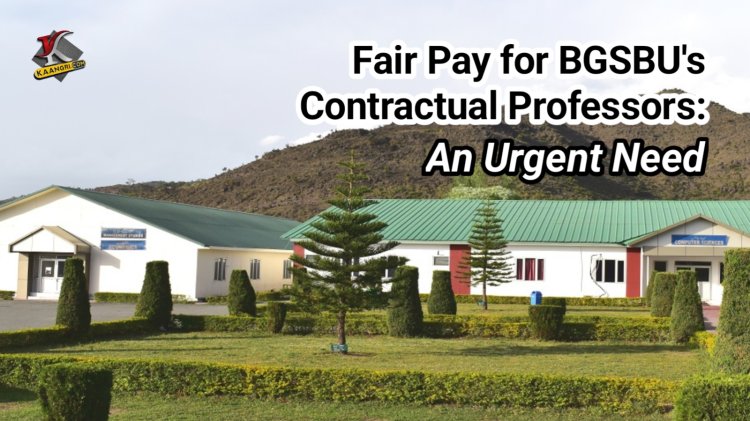Fair Pay for BGSBU's Contractual Professors: A Urgent Need

By Ayaz Mughal
In the lap of the Pir Panjal Range, where the Baba Ghulam Shah Badshah University (BGSBU) stands as a beacon of knowledge and learning, there lies a growing concern that demands immediate attention. It is not about the quality of education or the infrastructure but about something fundamental—the fair treatment and compensation of those who dedicate their lives to the pursuit of knowledge: the Contractual Assistant Professors.
Contractual Assistant Professors are the lifeblood of any academic institution. They are the ones who, despite their temporary status, carry the weight of the university's academic and research programs on their shoulders. They are passionate educators, dedicated researchers, and mentors who inspire the next generation. Yet, despite their indispensable contributions, their current compensation at BGSBU is far from commensurate with the value they bring to the institution.
Over the years, the cost of living has surged significantly, making it increasingly challenging for these teachers to make ends meet. Imagine holding an advanced degree, possessing expertise in your field, and contributing immensely to the academic success of an institution, only to receive a salary that barely covers your basic needs. This is the harsh reality that Contractual Assistant Professors at BGSBU are facing today.
To provide some context, let's take a look at the salary structures at other universities across the country:
- Jamia Millia Islamia, New Delhi offers ₹79,600 as per UGC Guidelines 2018 Basic Pay in Academic Pay Level 10 + DA.
- Islamic University of Science and Technology, Awantipora, Kashmir pays ₹50,000 to their Contractual Assistant Professors.
- Shri Mata Vaishno Devi University (SMVDU), Katra offers a salary of ₹60,000 per month for Master’s Degree holders and ₹70,000 per month for those with a Ph.D.
In stark contrast, Contractual Assistant Professors at BGSBU are receiving a modest ₹30,000 per month. This disparity is not just disheartening but also unfair, especially when one considers the vital role these educators play in shaping the future of the region.
A salary hike for these professors is not just a matter of fairness; it is an investment in the future of the university and the students it serves. A well-compensated faculty is more motivated, more committed, and more likely to stay with the institution for the long term. This stability is crucial for maintaining and enhancing the quality of education and research at BGSBU.
Moreover, aligning the salaries of Contractual Assistant Professors with the UGC guidelines and the New Education Policy would elevate the university's standing in the academic community. It would make BGSBU an attractive destination for top-tier educators and researchers, who might otherwise be drawn to institutions offering better compensation packages.
Overall, the call for a salary hike for Contractual Assistant Professors at BGSB University is not just about addressing a financial issue—it is about recognizing the value of teachers, ensuring their well-being, and ultimately, enhancing the academic excellence of the institution. It is a call to action that the university and the government must heed, for the sake of the faculty, the students, and the future of education in J&K and particularly in the Pir Panjal Region.









